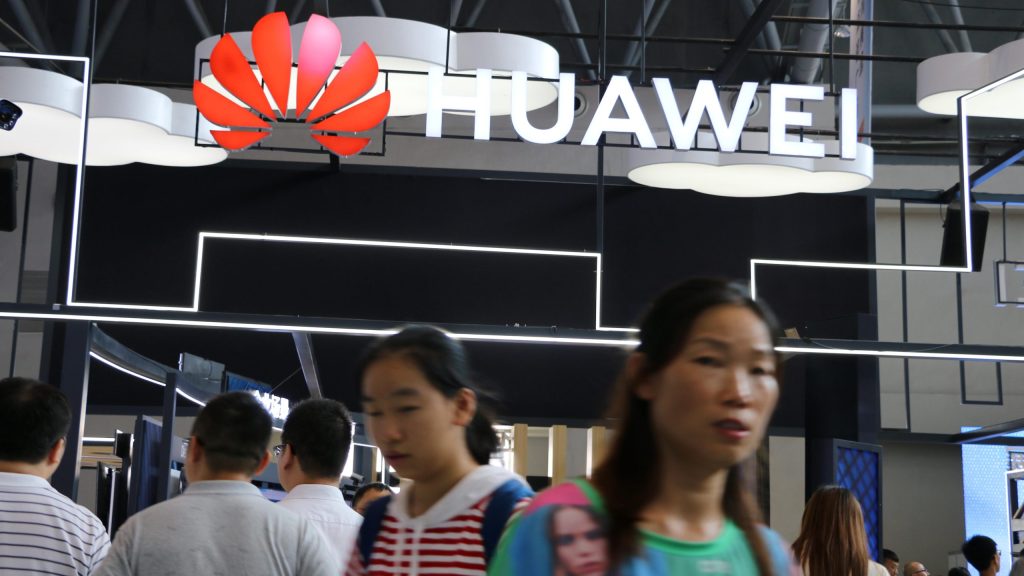Expanding internet access to the nearly half of humanity that’s currently unconnected is critical not only for economic and social development, but for national security and the future of democracy. Yet it’s largely not the democracies of the world stepping up to connect those billions of people—it’s digital authoritarians.
Consider China: Through its “Digital Silk Road,” Beijing is spending tens of billions of dollars to build the internet abroad, with the China Development Bank often financing the purchase of equipment from Chinese-owned, -backed, or -affiliated companies. For instance, Huawei alone reportedly controls 29 percent of the global market for network equipment. If the status quo continues, most new internet users will take their first online steps into a state-controlled, authoritarian-inclined digital landscape. At each step in this journey—from the fiber they use to connect to the hardware and the software they use once online—their data will feed Chinese firms that have few qualms about supporting Beijing’s authoritarian agenda.
Not only is China increasing its control over critical infrastructure and enhancing its surveillance capabilities, but it is also expanding its sphere of influence. For many governments interested in expanding internet access and growing their digital economies, Chinese financing is often the only option. In Africa, for example, Chinese investment in information and communications technology (ICT) infrastructure surpasses spending from African governments, Group of Seven (G7) nations, and multilateral agencies combined. Despite the fact that virtually all democracies have interests that are threatened by the expansion of authoritarian control over internet infrastructure, the democratic world hasn’t come up with a compelling alternative to Chinese financing.
US President Joe Biden’s Build Back Better World initiative and the European Union’s Global Gateway strategy both aim to mobilize development and private capital to invest in infrastructure in low- and middle-income countries. But neither of these initiatives is expected to provide enough resources or funding needed to counter China’s digital ambitions—or enable the types of community-focused connectivity providers that can best connect the unconnected. If democratic leaders want to meaningfully tackle digital divides in a way that promotes openness, democracy, and human rights online, the world needs substantially more money and new strategies to connect the hardest-to-reach people.
Financing the digital future
Failed efforts to close the gap have largely been a result of the false belief that the free market will deliver ubiquitous digitalization. But with more than twenty-five years of opportunity, and hundreds of billions of dollars in government subsidies for domestic expansion, it’s clear that traditional telecom operators alone will not connect everyone. Time and again, these operators have created broadband deserts and practiced modern forms of digital “redlining,” or leaving behind communities they deem too poor or too remote to be sufficiently attractive to connect.
I co-founded Connect Humanity, a fund to accelerate digital equity, out of a steadfast conviction that it’s possible to change the way broadband is built in order to connect everyone. We know how to connect people; it’s not a complex technical challenge. There are a plethora of viable operating and business models, and community connectivity providers—a collection of municipal networks, community networks, cooperatives, and other smaller and social ventures grounded in their communities—have already shown remarkable progress in connecting people in areas that have previously been left out.
In South Africa, Zenzeleni, a community-owned wireless service provider, offers affordable and reliable internet access to rural residents at the same speeds as those in the country’s urban centers. In Mexico, Rhizomatica is profitably connecting underserved rural indigenous communities. The most affordable broadband in the world is arguably a municipal network in Ammon, Idaho, which offers residents lightning-fast 1GB upload and download speeds for less than ten dollars per month.
These are the types of operators that can lead the world toward universal internet access, connecting the hardest-to-reach communities and often delivering better service at much lower prices. That’s because they’re maximizing value for the communities they serve, not far away shareholders. But they frequently turn a profit, and nearly all struggle with access to capital.
A Global Fund for Digital Equity
Most of these networks are too big for microfinance and philanthropy and too small for the huge loans offered by development-finance institutions, international aid, and commercial banks. Even when these connectivity providers have projects big enough for the latter, communities must often overcome discrimination or a lack of understanding from investors who are accustomed to working with traditional operators and don’t yet understand that other models are better-placed to provide internet for some communities.
A Global Fund for Digital Equity, led by an alliance of democratic countries, could fill this capital gap by providing the right types and sizes of support—primarily in the form of long-term, low-interest financing—for the community connectivity providers that have repeatedly proven able to connect the unconnected. There is precedent for such a fund in both enterprise funds and green banks; in both models, government funds have underwritten financial institutions dedicated to spurring the development of strategic but underserved markets. These funds have returned the principal to the governments while enabling new communities of entrepreneurs to emerge and flourish. Loans and credit guarantees from the US Development Finance Corporation (DFC) provide another useful model.
In addition to significant amounts of money, there is an urgent need for intermediaries that can disburse grants and loans in the sizes, structures, and blends tailored to the target communities and the operators serving them. Root Capital, for instance, has leveraged DFC credit facilities and guarantees to distribute $1.6 billion to small farming businesses across the Global South to improve the lives of more than ten million people in farming families, and has generated $4.6 billion in economic activity. Similar structures and intermediaries will be key to achieving digital equity for all.
The need to expand internet access to everyone—in a way that offers viable alternatives to China’s funding and vision for the internet—has never been clearer. The future of democracy, human rights, economic opportunity, and national security may all depend on it. But this demands that democracies of the world get off the sidelines, commit significant resources, and support the community-based models that have proven successful for connecting the unconnected. Will they step up, or continue to allow digital authoritarians to shape the online experience of billions of people?
Jochai Ben-Avie is a nonresident fellow at the Atlantic Council’s Digital Forensic Research Lab, the co-founder and chief executive of Connect Humanity, and a Truman National Security Fellow. A version of this post was published on Connect Humanity’s blog.
Further reading
Mon, Jun 6, 2022
Spyware like Pegasus is a warning: Digital authoritarianism can happen in democracies, too
New Atlanticist By
Journalists and citizens targeted by spyware warn the audience at the Digital Forensic Research Lab's 360/Open Summit about the proliferation of state-sponsored digital surveillance.
Tue, Jun 7, 2022
Moderating non-English content: Transparency and local contexts are critical
360/OS By Layla Mashkoor
The decisions made by content moderators and algorithms have significant impacts, not only in online information spaces but also offline.
Tue, Aug 31, 2021
Trusted connectivity: A framework for a free, open, and connected world
Issue Brief By Kaush Arha
As democracies address the global demand for a free, open, and connected world while ensuring that local and global emissions targets are met, they need an organizing framework: the concept of “trusted connectivity.”
Image: People visit the Huawei stand during an expo in Chongqing, China, on August 23, 2018. Photo by Oriental Image via Reuters Connect.



